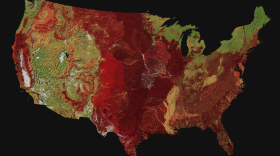
Molly Samuel
Molly Samuel joined WABE as a reporter in November 2014. Before coming on board, she was a science producer and reporter at KQED in San Francisco, where she won awards for her reporting on hydropower and on crude oil.
Molly was a fellow with the Middlebury Fellowships in Environmental Journalism and a journalist-in-residence at the National Evolutionary Synthesis Center.
She's from Atlanta, has a degree in Ancient Greek from Oberlin College and is a co-founder of the record label True Panther Sounds.
-
Starting practice at the hottest time of year, football players face dangers from the heat. Georgia high school heat rules have turned the state into a national model.
-
In Atlanta, leaders are working to build a memorial at an old brick factory site to honor victims of convict leasing. After the Civil War, thousands of Black men were forced to work at the factory.
-
Former Sen. Max Cleland of Georgia has died. He was 79 years old. He lost three limbs in Vietnam, but that didn't stop him from seeking higher office, where he advocated for veterans and the disabled.
-
There's a history of wildfire across America, a threat made worse by the warming climate. And more people are moving to fire-prone areas without realizing the danger.
-
Even as climate change makes wildfires more frequent and intense, more people are moving to fire-prone areas. The fastest such growth is in the Southeast, where few consider wildfire much of a threat.
-
Winters are warming faster than summers in many places, and colder parts of the U.S. are warming faster than hotter ones. The warming winter climate has year-round consequences across the country.
-
Construction of new, modern reactors seemed to herald a new era of nuclear power expansion in the U.S. Now all but one of those projects have been canceled.
-
In 2014, after disastrous spills and opposition from environmentalists, the Environmental Protection Agency imposed new rules on the storage of coal ash. Now utilities are planning to close down the ponds that hold the toxic ash, but it has to go somewhere. Environmentalists say the safest place for it is in securely lined landfills, such as the municipal landfill in Wayne County, Ga. Locals are fighting the plan, but there's not much they can do.
-
As homeowners embrace solar, utilities are making less money, and that's shaking up their business model. Companies in California and Georgia are handling the growth in dramatically different ways.
-
Atlanta's mayor wants to convince businesses that the city is a regional leader on climate change initiatives. But, in a city whose efforts are contradicted by its state, how much can the mayor do?






